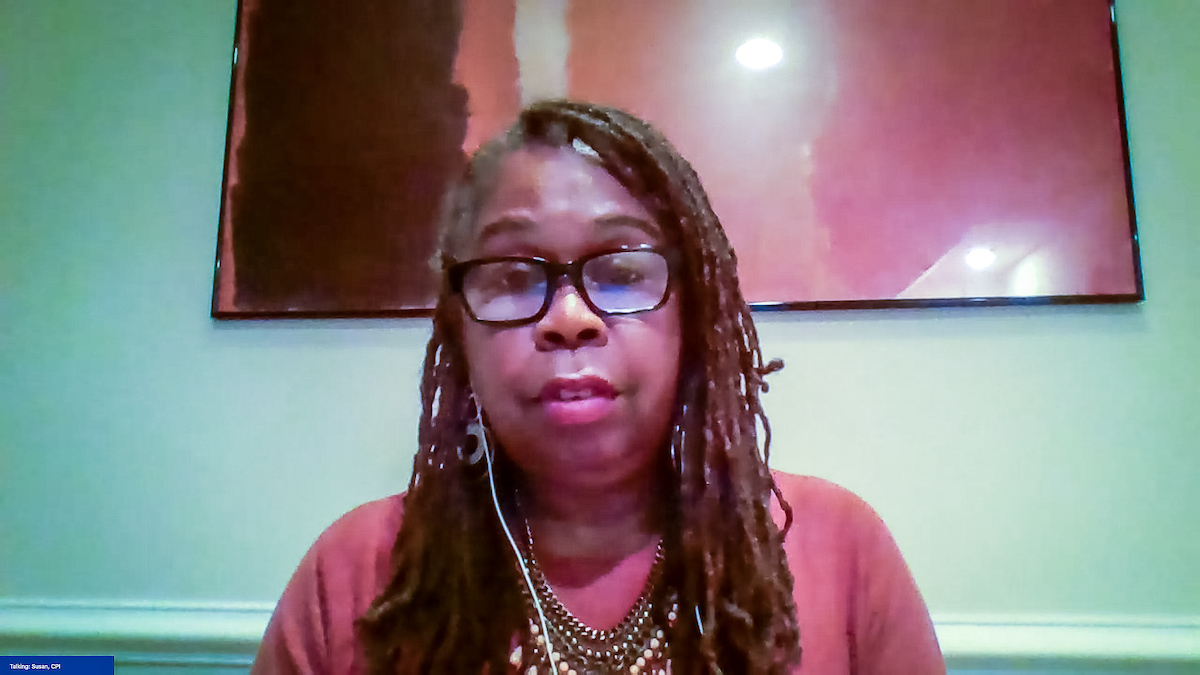After a tumultuous four years and a presidential election that rendered voters divided, journalists must work harder to regain the public’s trust by relying more on accurate and solutions-oriented reporting, according to a leading voice in nonprofit journalism.
“Journalism is one of the many industries and institutions that’s being called to task,” said Susan Smith Richardson, chief executive officer of the Center for Public Integrity at a Feb. 1 Arizona State University virtual event. “The work we do is so important, and we are under siege. I would even argue that we’re being interrogated, and rightly so, at a really important time for this country’s democracy.”
Richardson’s talk, “Misinformation, Trust and the Future of Journalism” was part of the spring 2021 “Must See Mondays” lecture series hosted by ASU's Walter Cronkite School of Journalism and Mass Communication.
The aftermath of the 2020 election provided an opportune time to have a frank discussion about trust in the news, said discussion moderator Kristy Roschke.
“A messy information environment and public decline in institutional trust have made it an especially difficult time for journalism,” said Roschke, managing director of the News Co/Lab, a Cronkite School initiative aimed at helping people find new ways of understanding and interacting with news and information. “Susan Smith Richardson is a leader in the community-focused, solutions-oriented journalism that plays a critical role in helping restore trust in the news media.”
Trust in the news has never been more critical, especially when the threat of misinformation dominates social streams, news sites and public airwaves. Richardson, who soon will leave her post as CEO of the Center for Public Integrity to join The Guardian U.S. as deputy editor, said this should be a period of self-examination and looking toward the future for journalists.
Susan Smith Richardson, former Chicago Reporter editor and publisher and current CEO of the Center for Public Integrity, talks about the essential elements of context, fairness, accuracy and transparency in reporting during an ASU Must See Mondays talk on Feb. 1. Screenshot by Charlie Leight/ASU News
Richardson said the last four years were a learning experience for all journalists, who had to walk a fine line when disseminating information.
“In many ways we weren’t prepared for an administration and presidency that didn’t play by the rules … there were lies coming out of an administration,” Richardson said. “We (news organizations) shouldn’t be spreading misinformation and we have to be mindful about the trust side … if we’ve got the megaphone, what are we doing if we allow knowingly false information to just circulate as another bit of information?”
Journalists, however, can regain some of the public’s trust if they continually practice transparency, objectivity, fairness and context. Newsrooms should also be reflective of society as much as possible, with plenty of diversity.
“The most dynamic newsrooms are the ones with the most diversity,” Richardson said. “Different perspectives are incredibly valuable.”
In addition to being the public’s watchdog and holding the powerful accountable, journalists should incorporate more solutions-based stories in their reporting. That means not only focusing on social issues but reporting on how people are responding to problems. These types of stories not only bring more balance but thoughtfully engage readers, Richardson said.
“We have a responsibility in mending our democracy and looking at ways in which people are responding to issues and how deep, evidenced-based investigative reporting of those responses actually open up a door to both community-building and providing people with information that they want, and indeed, may need,” Richardson said. “This is a moment when solutions journalism should be tried.”
Richardson said journalists aren’t the only ones who should be held accountable – Americans have a duty to improve their news literacy. They also need to have a better understanding of civics, their role in government, and how to find a credible news source when misinformation abounds on the social media platforms where they often consume their news.
“It’s important for the country to have media literacy, which is a grounding piece,” Richardson said. “There has to be some training in vetting information and an understanding of this big media ecosystem. And that has to be coupled with civics.”
Roschke said a new Cronkite degree in digital media literacy launching in the fall is not only good timing, but necessary.
“There is no singular fix to restoring trust in the media and other democratic institutions,” Roschke said. “It will take a concerted effort that includes challenging norms in education, journalism and civic participation. As Susan said, this is a perfect time to explore new approaches.”
More Law, journalism and politics

When police moonlight, who’s watching?
When police officers work off-duty security jobs, or “moonlight,” often in uniform and sometimes with full police powers, the lines between public service and private interest can blur.A new…

Arizona tax changes this year: What to know
Let’s face it: Tax season is rarely anyone’s favorite time of year. And this time around, there’s an added wrinkle as Arizona’s tax code is in flux.Arizona lawmakers are debating which of the recent…

ASU course inspires students from different majors to engage with government
On a brisk January morning, about 50 students file into a classroom on Arizona State University's Downtown Phoenix campus. Many of the students are majoring in journalism or nursing but they are…

